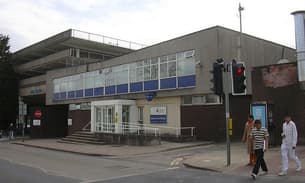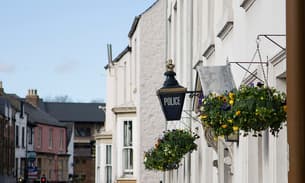
Forensic examinations of rape victims plummet in London
Picture by Fabbio at Flickr
Numbers of forensic examinations carried out on victims of rape and serious sexual assault in London have plummeted in recent years despite a dramatic rise in attacks being reported to police.
Yesterday the Bureau revealed details of a damning NHS investigation that found Mid Staffordshire-style failings at one of three specialist centres – known as Havens – that carry out all intimate forensic examinations of sexual assault victims in London.
Now, the Bureau can reveal that numbers of forensic examinations carried out at the Havens have fallen by more than a third – or 700 cases – since a peak in 2005/6.
Most Havens clients are victims of rape who have been referred by the Metropolitan Police, though people may also self-refer after an attack.
Neither the NHS nor Metropolitan Police Service has been able to explain the decline in attendance at the centres.
The decrease is particularly remarkable given that allegations of rapes made to the police have increased dramatically over the last five years.
Shadow attorney general Emily Thornberry says the figures will heighten fears that cases of rape and sexual assault are still not being properly investigated.
Earlier this year her office released data obtained from the Solicitor General which showed that fewer rapes are being referred by the police to the Crown Prosecution Service in London and nationally.
‘A black hole has opened up in the criminal justice system into which more and more cases are disappearing,’ she told the Bureau. ‘The fear has to be that they are being dropped without being properly investigated, a fear which is strengthened by these important findings on the Havens.’
Between 2008/9 and 2012/13 numbers of rape allegations in the capital rose by more than a third. During the same period numbers of forensic examinations – most of which are performed on rape victims – fell by 28%, or 494 cases.
This cannot be explained by an increase in the numbers of historic rapes being reported that do not require forensic tests.
Non-forensic clients of the Havens have also fallen
There has only been a small percentage increase in numbers of rape victims reporting outside the ‘forensic window’ of seven days.
Victims who report outside of the forensic window but within a year of the attack are meant to be referred to the Havens. Although a forensic examination is not necessary for these victims, the specialist medical and psychological care they receive assists their recovery.
People supported in this way are less likely to withdraw co-operation from police investigations into their attackers.
But the Bureau’s data on these ‘non-forensic’ clients, which is only available for the least three financial years, shows a decline of 120 cases, or 24% in that time.
Whitechapel Haven was closed between March and July 2012 after systemic clinical and governance failings emerged, and re-opened with reduced hours.
The Bureau’s investigation showed that the problems at Whitechapel exacerbated the long-term decline in Haven attendance. It found that 370 fewer people attended one of the three Havens in the year to the end of March 2013 than the year before – a 19% decrease. Numbers did not recover substantially over summer 2013.
Ms Thornberry said: ‘It seems to me that to fail to refer a victim to a place where they can be supported and where forensic evidence can be gathered is to fail to take even the most basic steps towards building a case.’
The service offered by the Havens is widely accepted to significantly help criminal investigations.
Research by Lesley McMillan, professor of criminology at Glasgow Caledonian University, on a cohort of rape cases in Sussex, found that collection of forensic evidence from a victim – even if it was not incriminating – increased the chance of the case being referred to the CPS and charged, and decreased the chance of the victim withdrawing co-operation with the investigation.
The Met and the NHS have been conducting research over the last two years to find the reason for the long-term decline in Havens referrals but have not reached any conclusions.
Dramatic increase in cases marked inapplicable
A recent internal Metropolitan police document on sexual violence raised concerns over a ‘dramatic increase’ in cases marked as non-applicable and victims who are declining the service.
The report also said Havens attendance had an important bearing on whether or not a case drops out of the criminal justice system.
A different report jointly produced by the Havens and the Metropolitan police in 2012 also highlighted concerns among NHS staff about whether police were referring cases that fell outside the ‘forensic window’ – a period of 7 days in which forensic details can be captured. The Havens are supposed to be available for anybody reporting a sexual attack within 12 months of the assault, as the units are able to offer support and other help.
The report recommended police reporting systems be changed to require a Haven referral number wherever the time of offence fell within 12 months of the victim reporting to the police.
A Met spokesman told the Bureau this would be too costly and complicated to implement but said that staff had been given additional training. He added: “We are continually evaluating how to improve referrals and streamline the pathway.”
Current trial projects include a system whereby victims are taken immediately to the Haven rather than waiting for a specialist officer to arrive. Early results show this has reduced waiting times by three hours but has not significantly improved numbers of referrals. In another pilot, people who decline a Havens appointment are being followed up by a phone call from a Havens doctor.
The Met’s Deputy Assistant Commissioner Martin Hewitt, who is a national police leader on sexual offences, called this month for an ‘open and honest debate’ about rape and the criminal justice system. He encouraged victims to report rape but said they needed to know that only a third of rape cases that are prosecuted ended in conviction.
In a statement, the Metropolitan Police told the Bureau there had been a 4 per cent increase in the number of police referrals to the Havens made between April and November, compared with the same period last year, which the force believes is due to improved training for specialist officers.
The statement added: ‘We recognise there is work to be done in this area and are therefore working closely with The Havens to further increase the number of referrals. As part of this ongoing work we are delivering front-line responder training to all staff.’
The Data
| Year | Numbers of forensic examinations performed at the Havens (rape and serious sexual assault) | Numbers of forensic referrals to the Havens from the police (rape and serious sexual assault) | Numbers of allegations (rape only) |
| 2005/6 | 1932 | 1630 | Not available |
| 2006/7 | 1895 | 1653 | Not available |
| 2007/8 | 1789 | 1504 | Not available |
| 2008/9 | 1727 | 1399 | 2916 |
| 2009/10 | 1723 | 1477 | 3588 |
| 2010/11 | 1543 | 1366 | 4117 |
| 2011/12 | 1493 | 1279 | 4277 |
| 2012/13 | 1233 | 1074 | 4170 |
| Year | Forensic examinations performed on rape victims at Havens | Rape victims referred to Havens by police | Rape allegations made to police | % rape allegations referred by police for forensic examinations | Rape offences recorded by police |
| 2008 | 1291 | 1064 | 2880 | 36.9 | 2137 |
| 2009 | 1301 | 1128 | 3302 | 34.1 | 2601 |
| 2010 | 1235 | 1120 | 4010 | 27.9 | 3188 |
| 2011 | 1174 | 1051 | 4344 | 24.2 | 3427 |
| 2012 | 1006 | 887 | 4173 | 21.3 | 3105 |
| Jan-Aug 2013 | 638 | 580 | 2914 | 19.9 | 2460 |





